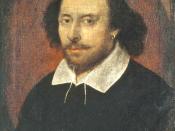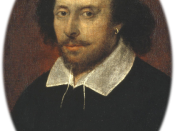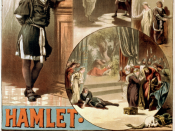Scholarly critics around the world regard William Shakespeare's "Hamlet" and Robert Bolt's "A man for all seasons", as one of the greatest tragedies of all time. Although the two tragedies are set in different times and places, and are written in completely different styles, they both describe the stories of two great men, who are faced with moral dilemmas that will determine the outcomes of their lives. Both, Hamlet and Sir Thomas More (the protagonists of the two tragedies) are pictured like soldiers that are thrown into a war where they have to do some things they rather would avoid doing.
A Tragic Hero is one (usually a person of noble blood) who brings about his own downfall through a flaw in his character. Although in the beginning of the play, he seems quite happy and quite sane, as the play's plot unfolds, we find that the hero possesses a flaw that is the cause of the protagonists's tragic death.
Some of the classic examples of these weaknesses, or flaws include Othello's jealousy, Macbeth's ambition, and Lear's a need to be loved. Both, Hamlet, and Sir Thomas More possess unusual flaws, which is why sometimes they are regarded as the perfect heroes, instead of the tragic ones. Hamlet's flaw is his procrastination, while More flaw is being a slave to his conscience.
In the play "Hamlet", by William Shakespeare, Hamlet is described as daring, brave, loyal, and intelligent, but he is consumed by his own thoughts. Hamlet's duty to take revenge for his father's murder. This leads Hamlet, a philosopher not a killer, to search deep within himself for the solution to his plight. Hamlet's "pale cast of thoughts" has constantly undermined his resolution, resulting in his inaction, which, in turn, causes him deep unrest and depression. Hamlet's indecisive pursuit...


